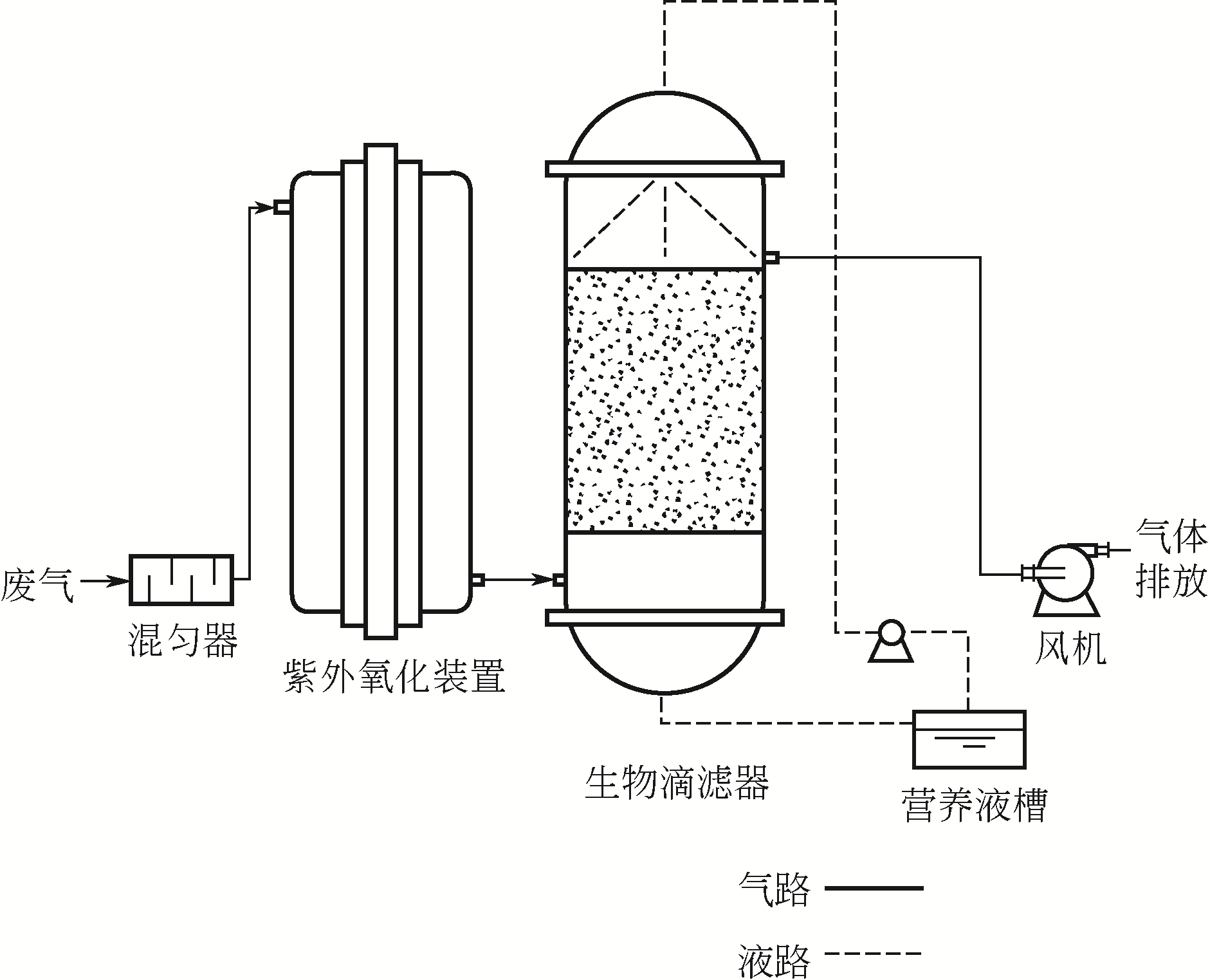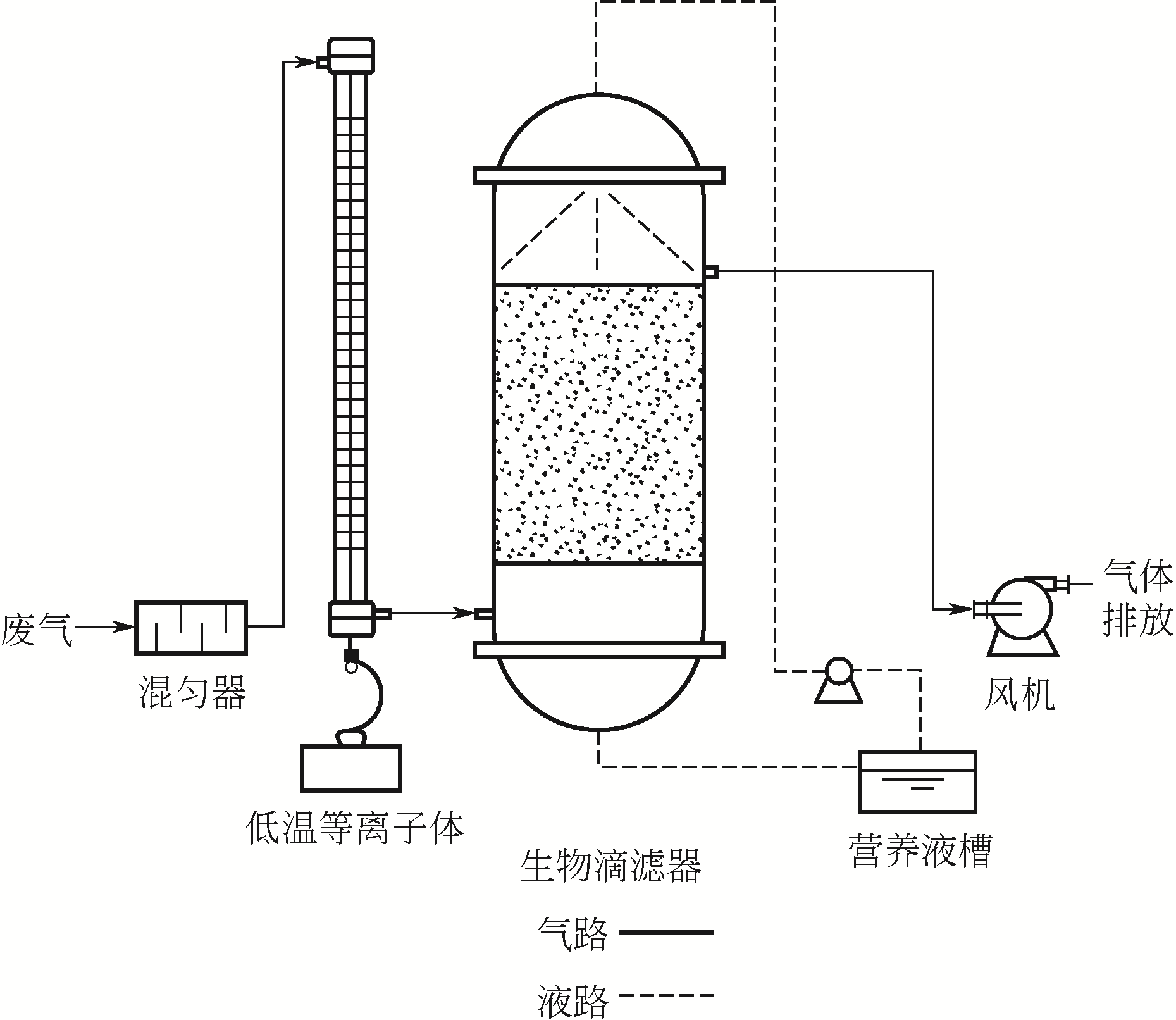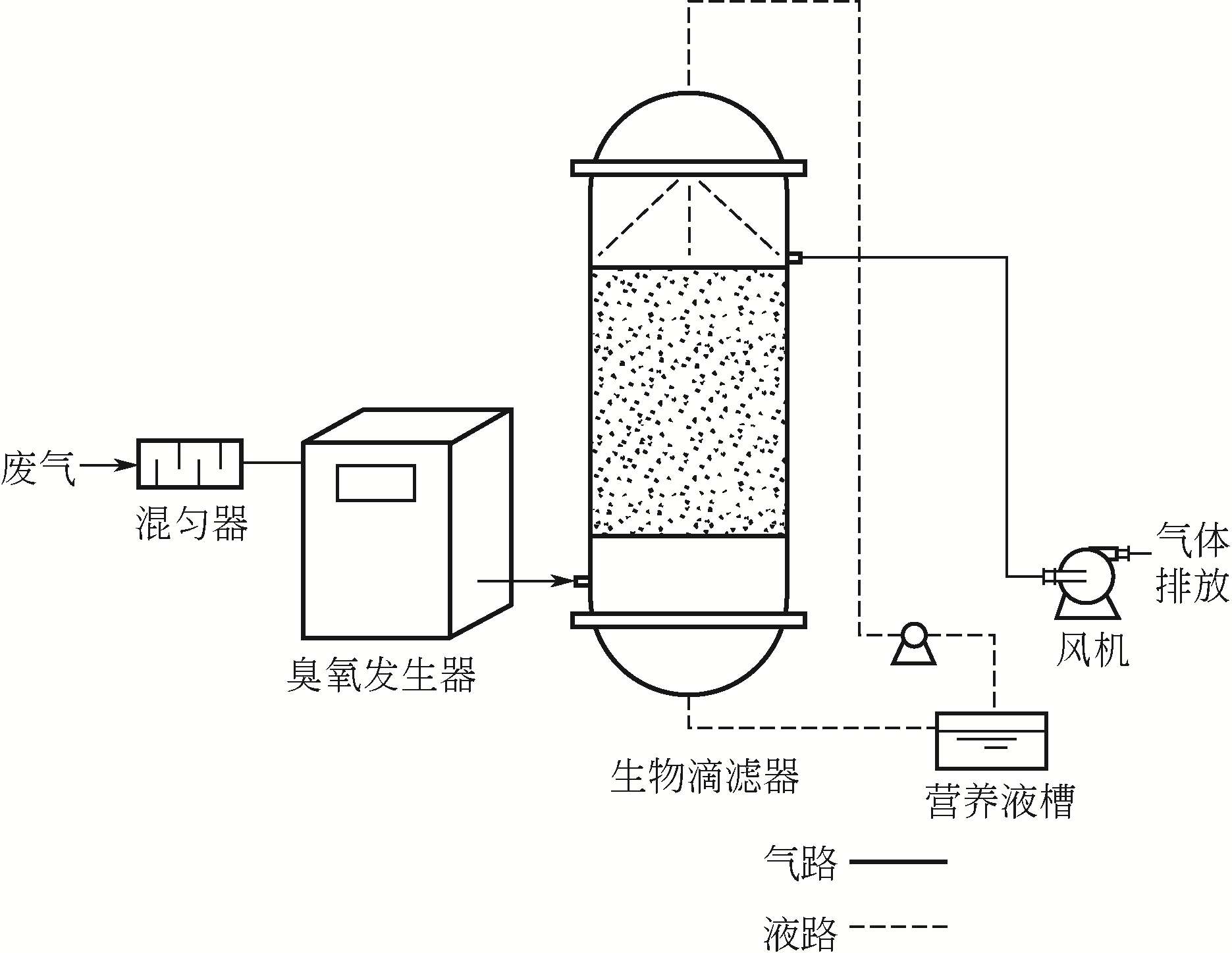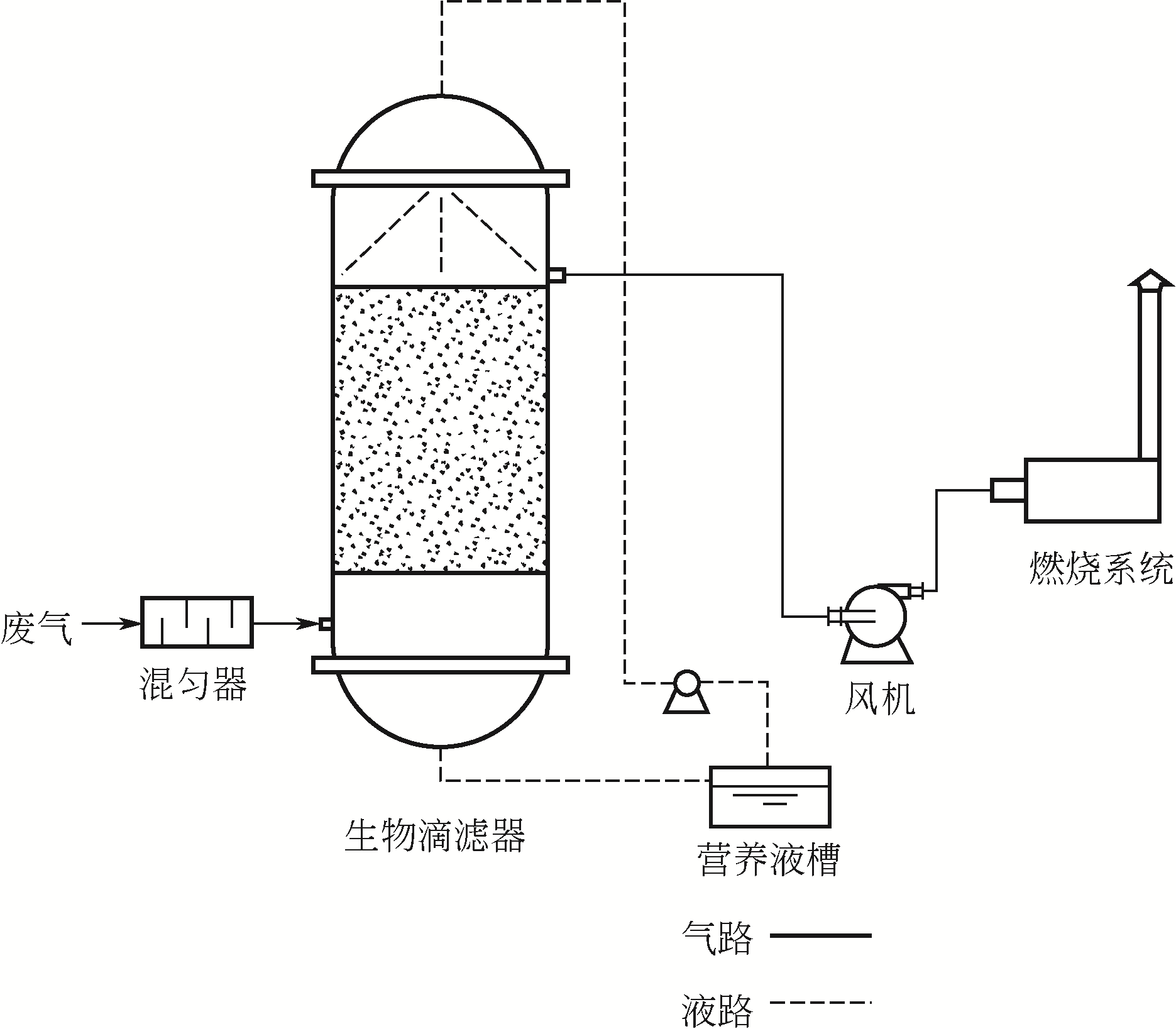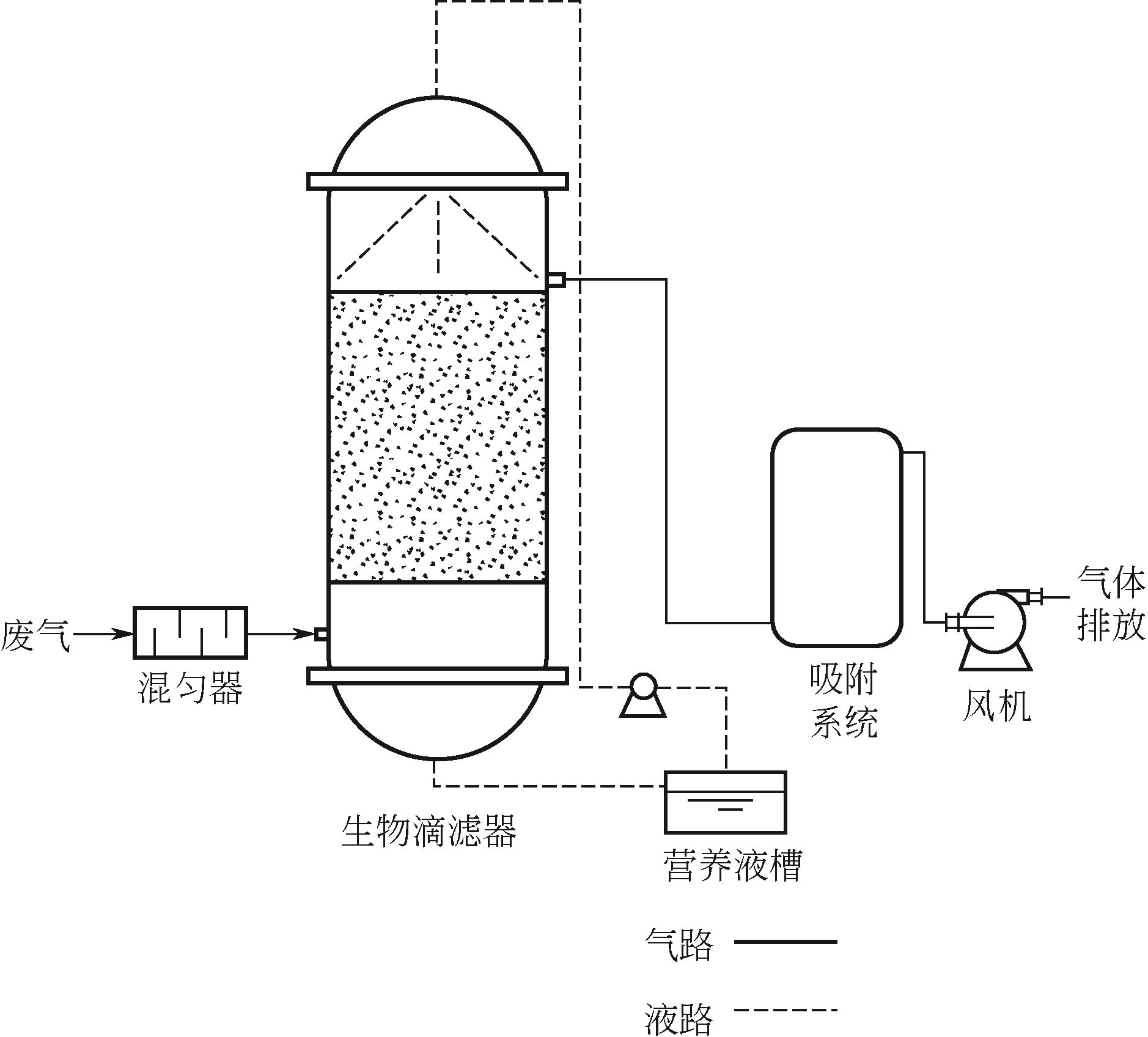Chemical Industry and Engineering Progress ›› 2021, Vol. 40 ›› Issue (5): 2802-2812.DOI: 10.16085/j.issn.1000-6613.2020-1234
• Resources and environmental engineering • Previous Articles Next Articles
Recent advances in biological combined technology for VOCs treatment
DU Jiahui( ), LIU Jia(
), LIU Jia( ), YANG Juping, QI Hongyi, DOU Xiaona, LI Jian
), YANG Juping, QI Hongyi, DOU Xiaona, LI Jian
- Key Laboratory of Beijing on Regional Air Pollution Control, Beijing University of Technology, Beijing 100124, China
-
Received:2020-07-01Online:2021-05-24Published:2021-05-06 -
Contact:LIU Jia
生物法联合工艺治理VOCs的研究进展
杜佳辉( ), 刘佳(
), 刘佳( ), 杨菊平, 祁弘毅, 窦晓娜, 李坚
), 杨菊平, 祁弘毅, 窦晓娜, 李坚
- 北京工业大学区域大气复合污染防治北京市重点实验室,北京 100124
-
通讯作者:刘佳 -
作者简介:杜佳辉(1995—),女,硕士研究生,研究方向为大气污染控制。E-mail:13041082628@163.com 。 -
基金资助:北京市教育委员会科技计划一般项目(KM201810005034)
CLC Number:
Cite this article
DU Jiahui, LIU Jia, YANG Juping, QI Hongyi, DOU Xiaona, LI Jian. Recent advances in biological combined technology for VOCs treatment[J]. Chemical Industry and Engineering Progress, 2021, 40(5): 2802-2812.
杜佳辉, 刘佳, 杨菊平, 祁弘毅, 窦晓娜, 李坚. 生物法联合工艺治理VOCs的研究进展[J]. 化工进展, 2021, 40(5): 2802-2812.
share this article
Add to citation manager EndNote|Ris|BibTeX
URL: https://hgjz.cip.com.cn/EN/10.16085/j.issn.1000-6613.2020-1234
| 1 | SUN Jian, SHEN Zhenxing, ZHANG Yue, et al. Urban VOC profiles, possible sources, and its role in ozone formation for a summer campaign over Xi’an, China[J]. Environmental Science and Pollution Research, 2019, 26(27): 27769-27782. |
| 2 | LIU Yafei, SONG Mengdi, LIU Xingang, et al. Characterization and sources of volatile organic compounds (VOCs) and their related changes during ozone pollution days in 2016 in Beijing, China[J]. Environmental Pollution, 2020, 257:113599. |
| 3 | RAO Zepeng, SHI Gansheng, WANG Zhuang, et al. Photocatalytic degradation of gaseous VOCs over Tm3+-TiO2: revealing the activity enhancement mechanism and different reaction paths[J]. Chemical Engineering Journal, 2020, 395:125078. |
| 4 | KAMAL Muhammad Shahzad, RAZZAK Shaikh A, HOSSAIN Mohammad M. Catalytic oxidation of volatile organic compounds (VOCs)—A review[J]. Atmospheric Environment, 2016, 140: 117-134. |
| 5 | GOSPODAREK Milena, RYBARCZYK Piotr, SZULCZYNSKI Bartosz, et al. Comparative evaluation of selected biological methods for the removal of hydrophilic and hydrophobic odorous VOCs from air[J]. Processes, 2019, 7(4):187. |
| 6 | LIU Huijuan, XU Bowen, WEI Keyan, et al. Adsorption of low-concentration VOCs on various adsorbents: correlating partition coefficient with surface energy of adsorbent[J]. Science of the Total Environment, 2020, 733:139376. |
| 7 | GUAN Yanan, WANG Lei, WANG Shujuan, et al. Temporal variations and source apportionment of volatile organic compounds at an urban site in Shijiazhuang, China[J]. Journal of Environmental Sciences, 2020, 97: 25-34. |
| 8 | 黎焕珍. 关于工业VOC的危害分析及治理技术探讨[J]. 环境与发展, 2019, 31(2): 65-66. |
| LI Huanzhen. Discussion on hazard analysis and treatment technology of industrial VOC[J]. Environment and Development, 2019, 31(2): 65-66. | |
| 9 | 杜芳芳. 大气环境中挥发性有机废气治理技术发展研究[J].山西化工, 2020, 40 (1): 158-159, 162. |
| DU Fangfang. Study on the development of the treatment technology of VOCs in the atmospheric environment[J]. Shanxi Chemical Industry, 2020, 40 (1): 158-159, 162. | |
| 10 | ESTRADA Jose M, KRAAKMAN N J R B, MUNOZ Raul, et al. A comparative analysis of odour treatment technologies in wastewater treatment plants[J]. Environmental Science & Technology, 2011, 45(3): 1100-1106. |
| 11 | LIANG Zhishu, WANG Jijun, ZHANG Yuna, et al. Removal of volatile organic compounds (VOCs) emitted from a textile dyeing wastewater treatment plant and the attenuation of respiratory health risks using a pilot-scale biofilter[J]. Journal of Cleaner Production, 2020, 253:120019. |
| 12 | RYU H W, CHO K S, LEE T H. Reduction of ammonia and volatile organic compounds from food waste-composting facilities using a novel anti-clogging biofilter system[J]. Bioresource Technology, 2011, 102(7): 4654-4660. |
| 13 | YANG Chunping, QIAN Hui, LI Xiang, et al. Simultaneous removal of multicomponent VOCs in biofilters[J]. Trends in Biotechnology, 2018, 36(7): 673-685. |
| 14 | HAZRATI Hossein, SHAYEGAN Jalal. Influence of suspended carrier on membrane fouling and biological removal of styrene and ethylbenzene in MBR[J]. Journal of the Taiwan Institute of Chemical Engineers, 2016, 64: 59-68. |
| 15 | HAZRATI Hossein, SHAYEGAN Jalal, SEYEDI Seyed Mojtaba. Biodegradation kinetics and interactions of styrene and ethylbenzene as single and dual substrates for a mixed bacterial culture[J]. Journal of Environmental Health Science and Engineering, 2015, 13(1): 1-12. |
| 16 | KHORAMFAR Shooka, JONES Kim D, BOSWELL James, et al. Evaluation of a sequential biotrickling-biofiltration unit for removal of VOCs from the headspace of crude oil storage tanks[J]. Journal of Chemical Technology & Biotechnology, 2018, 93(6): 1778-1789. |
| 17 | CHENG Yan, HE Huijun, YANG Chunping, et al. Challenges and solutions for biofiltration of hydrophobic volatile organic compounds[J]. Biotechnology Advances, 2016, 34(6): 1091-1102. |
| 18 | 兰善红, 温志良, 杨达, 等. 化学氧化-生物法处理挥发性有机废气研究[J]. 化工科技, 2018, 26(3): 38-41, 60. |
| LAN Shanhong, WEN Zhiliang, YANG Da, et al. Treatment of volatile organic waste gas by chemical oxidation-biological process[J]. Science & Technology in Chemical Industry, 2018, 26(3): 38-41, 60. | |
| 19 | 蒋昊羽. 生物滴滤法与光催化法联用对二甲苯降解的探究[D]. 西安: 西安建筑科技大学, 2018. |
| JIANG Haoyu. The exploration of biological trickle filter combined with photocatalysis to degradation dimethylbenzene[D]. Xi’an: Xi’an University of Architecture and Technology, 2018. | |
| 20 | 郭宇辰, 李泊均, 南海娇, 等.VOCs废气处理技术的研究进展[J]. 化工管理, 2019(7): 114-116. |
| GUO Yuchen, LI Bojun, Haijiao NAN, et al. Research progress in VOCs exhaust gas treatment technology[J]. Chemical Enterprise Management, 2019(7): 114-116. | |
| 21 | 姜记东, 张长平, 白珺. 紫外光氧化技术处理VOCs研究进展[J]. 资源节约与环保, 2020(1): 80. |
| JIANG Jidong, ZHANG Changping, BAI Jun. Research progress of ultraviolet light oxidation technology to treat VOCs[J]. Resources Economization & Environmental Protection, 2020(1): 80. | |
| 22 | 王锦华, 杨军, 徐海波, 等. 紫外光解处理石化污水臭气中VOCs的应用研究[J]. 环境工程, 2019, 37(7): 148-152. |
| WANG Jinhua, YANG Jun, XU Haibo, et al. Application research on treatment of odor and VOCs in petrochemical wastewater by ultraviolet photolysis[J]. Environmental Engineering, 2019, 37(7): 148-152. | |
| 23 | 陈金垒, 陈雨桐, 陈铭敏, 等. 光催化与生物处理组合技术的研究进展[J]. 广州化工, 2020, 48(3): 23-25. |
| CHEN Jinlei, CHEN Yutong, CHEN Mingmin, et al. Research progress on combined technology of photocatalysis and biological treatment[J]. Guangzhou Chemical Industry, 2020, 48(3): 23-25. | |
| 24 | 袁昊, 刘忠强, 陈大华. 紫外光在环保处理中的应用研究[J]. 灯与照明, 2018, 42(4): 38-41, 45. |
| YUAN Hao, LIU Zhongqiang, CHEN Dahua. Application of ultraviolet light in environmental protection treatment[J]. Light & Lighting, 2018, 42(4): 38-41, 45. | |
| 25 | 李玉林, 李成, 王立新, 等.生物滴滤+氧化+紫外光解技术在污水除臭中的应用[J]. 神华科技, 2017, 15(5): 93-95. |
| LI Yulin, LI Cheng, WANG Lixin, et al. Biological filter + oxidation + ultraviolet photolysis degradation technology's application in sewage deodorant [J]. Shenhua Science and Technology, 2017, 15(5): 93-95. | |
| 26 | YU Jianming, LIU Wei, CHENG Zhuowei, et al. Dichloromethane removal and microbial variations in a combination of UV pretreatment and biotrickling filtration[J]. Journal of Hazardous Materials, 2014, 268: 14-22. |
| 27 | ZHU Runye, CHRISTIAN Kennes, CHENG Zhuowei, et al. Styrene removal in a biotrickling filter and a combined UV-biotrickling filter: steady- and transient-state performance and microbial analysis[J]. Chemical Engineering Journal, 2015, 275: 168-178. |
| 28 | VOLHARD Max-Fabian, CHRIST Jonas Johannes, BLANK Lars Mathias, et al. Seawater activated TiO2 photocatalyst for degradation of organic compounds[J]. Sustainable Chemistry and Pharmacy, 2020, 16:100251. |
| 29 | ZHANG Xin, YUAN Xingzhong, JIANG Longbo, et al. Powerful combination of 2D g-C3N4 and 2D nanomaterials for photocatalysis: recent advances[J]. Chemical Engineering Journal, 2020, 390:124475. |
| 30 | ZHANG Yanzong, XIONG Xiaoyan, HAN Yue, et al. Photoelectrocatalytic degradation of recalcitrant organic pollutants using TiO2 film electrodes: an overview[J]. Chemosphere, 2012, 88(2): 145-154. |
| 31 | 张强. 光催化氧化耦合生物滴滤净化恶臭气体的试验研究[D]. 扬州: 扬州大学, 2019. |
| ZHANG Qiang. Experimental study on photocatalytic oxidation coupled with bio-trickling to purify malodorous gases[D]. Yangzhou: Yangzhou University, 2019. | |
| 32 | HINOJOSA-REYES M, RODRIGUEZ-GOZALEZ V, ARRIAGA S. Enhancing ethylbenzene vapors degradation in a hybrid system based on photocatalytic oxidation UV/TiO2-In and a biofiltration process[J]. Journal of Hazardous Materials, 2012, 209/210: 365-371. |
| 33 | 黄修行. 光催化组合生物滴滤塔工艺处理氯苯的初步研究[D]. 广州: 广东工业大学, 2014. |
| HUANG Xiuxing. The preliminary study of a combination of photocatalytic and bio-trickling filter process on degradation of chlorobenzene[D]. Guangzhou: Guangdong University of Technology, 2014. | |
| 34 | 韩忠明. 深度光催化氧化耦合生物洗涤技术处理污水恶臭气体[J]. 安全、健康和环境, 2019, 19(5): 30-34. |
| HAN Zhongming. Enhanced photocatalytic oxidation technology coupled with bioscrubber for the removal of odor in sewage treatment plant[J]. Safety Health & Environment, 2019, 19(5): 30-34. | |
| 35 | HAGER S, BAUER R, KUDIELK A G. Photocatalytic oxidation of gaseous chlorinated organics over titanium dioxide[J]. Chemosphere, 2000, 41(8): 1219-1225. |
| 36 | MOUSSAVI Gholamreza, MOHSENI Madjid. Using UV pretreatment to enhance biofiltration of mixtures of aromatic VOCs[J]. Journal of Hazardous Materials, 2007, 144(1/2): 59-66. |
| 37 | WANG Can, XI Jinying, HU Hongying, et al. Advantages of combined UV photodegradation and biofiltration processes to treat gaseous chlorobenzene[J]. Journal of Hazardous Materials, 2009, 171(1/2/3): 1120-1125. |
| 38 | WANG Can, XI Jinying, HU Hongying, et al. Effects of UV pretreatment on microbial community structure and metabolic characteristics in a subsequent biofilter treating gaseous chlorobenzene[J]. Bioresource Technology, 2009, 100(23): 5581-5587. |
| 39 | 王灿, 席劲瑛, 胡洪营, 等. 紫外光降解对生物过滤塔去除氯苯性能的影响机制研究[J]. 环境科学, 2012, 33(1): 32-36. |
| WANG Can, XI Jinying, HU Hongying, et al. Mechanisms of UV photodegradation on performance of a subsequent biofilter treating gaseous chlorobenzene[J]. Environmental Science, 2012, 33(1): 32-36. | |
| 40 | PALAU Jordi, PENYA-ROJA Josep M, GABALDON Carmen, et al. Effect of pre-treatments based on UV photocatalysis and photo-oxidation on toluene biofiltration performance[J]. Journal of Chemical Technology and Biotechnology, 2012, 87(1): 65-72. |
| 41 | CHENG Zhuowei, ZHANG Lili, CHEN Jianmeng, et al. Treatment of gaseous alpha-pinene by a combined system containing photo oxidation and aerobic biotrickling filtration[J]. Journal of Hazardous Materials, 2011, 192(3): 1650-1658. |
| 42 | 杜长明, 李子明, 黄娅妮, 等. 等离子体与生物过滤联合净化有机废气新技术[C]//中国环境科学学会. 2016年中国环境科学学会学术年会论文集(第四版). 海口: 中国环境科学学会, 2016: 73-81. |
| DU Changming, LI Ziming, HUANG Yani, et al. A new technology for purifying organic waste gas by plasma and biofiltration[C]//Chinese Society for Environmental Sciences. Proceedings of the 2016 Annual Conference of Chinese Society for Environmental Sciences (fourth edition). Haikou, China: Chinese Society for Environmental Sciences, 2016: 73-81. | |
| 43 | 吴艳. 介质阻挡放电等离子体增强生物滴滤去除有机废气实验研究[D]. 杭州: 浙江大学, 2013. |
| WU Yan. Study on volatile organic compounds treatment using biotrickling filter enhanced with dielectric barrier discharge[D]. Hangzhou: Zhejiang University, 2013. | |
| 44 | 孙彪. 低温等离子体联合生物滴滤降解挥发性有机物研究[D]. 青岛: 青岛科技大学, 2017. |
| SUN Biao. Study on degradation of volatile organic compounds by low temperature plasma and biotrickling filter[D]. Qingdao: Qingdao University of Science & Technology, 2017. | |
| 45 | SCHIAVON Marco, TORRETTA Vincenzo, CASAZZA Andrea, et al. Non-thermal plasma as an innovative option for the abatement of volatile organic compounds: a review[J]. Water, Air & Soil Pollution, 2017, 228(10): 1-20. |
| 46 | WEI Z S, LI H Q, HE J C, et al. Removal of dimethyl sulfide by the combination of non-thermal plasma and biological process[J]. Bioresource Technology, 2013, 146: 451-456. |
| 47 | ZHU Runye, MAO Yubo, JIANG Liying, et al. Performance of chlorobenzene removal in a nonthermal plasma catalysis reactor and evaluation of its byproducts[J]. Chemical Engineering Journal, 2015, 279: 463-471. |
| 48 | SCHIAVON Marco, SCHIORLIN Milko, TORRETTA Vincenzo, et al. Non-thermal plasma assisting the biofiltration of volatile organic compounds[J]. Journal of Cleaner Production, 2017, 148: 498-508. |
| 49 | MARTINI Luca Matteo, COLLER Graziano, SCHIAVON Marco, et al. Non-thermal plasma in waste composting facilities: from a laboratory-scale experiment to a scaled-up economic model[J]. Journal of Cleaner Production, 2019, 230: 230-240. |
| 50 | 李华琴, 何觉聪, 陈洲洋, 等. 低温等离子体-生物法处理硫化氢气体研究[J]. 环境科学, 2014, 35(4): 1256-1262. |
| LI Huaqin, HE Juecong, CHEN Zhouyang, et al. Hydrogen sulfide removal by the combination of non-thermal plasma and biological process[J]. Environmental Science, 2014, 35(4): 1256-1262. | |
| 51 | JIANG Liying, LI Hui, CHEN Jianmeng, et al. Combination of non-thermal plasma and biotrickling filter for chlorobenzene removal[J]. Journal of Chemical Technology & Biotechnology, 2016, 91(12): 3079-3087. |
| 52 | 聂国锋. 等离子体催化/生物滴滤耦合降解含氯VOCs的工艺特性[D]. 杭州: 浙江工业大学, 2016. |
| NIE Guofeng. Characteristics of nonthermal plasma catalysis reactor coupled with bio-trickling filter for chlorinated VOCs treatment[D]. Hangzhou: Zhejiang University of Technology, 2016. | |
| 53 | LU C S, LIN M R, WEY I H. Removal of EATX from waste gases by a trickle-bed air biofilter[J]. Journal of Environmental Engineering, 2001, 127(10): 946-951. |
| 54 | 方美青. O3氧化-化学吸收联合处理再生胶恶臭气体的研究及应用[D]. 杭州: 浙江工业大学, 2010. |
| FANG Meiqing. Research on reclaimed rubber exhaust gas treated with O3 oxidation coupled with chemical absorption[D]. Hangzhou: Zhejiang University of Technology, 2010. | |
| 55 | 杨传忠, 荣中原, 廖庆花, 等. 污水处理厂臭气处理方法分析[J]. 再生资源与循环经济, 2019, 12(7): 38-40. |
| YANG Chuanzhong, RONG Zhongyuan, LIAO Qinghua, et al. Analysis of common deodorization methods in sewage treatment station[J]. Recyclable Resources and Circular Economy, 2019, 12(7): 38-40. | |
| 56 | 张超, 赵梦升, 张丽丽, 等. 微量臭氧强化生物滴滤降解甲苯性能研究[J]. 环境科学, 2013, 34(12): 4669-4674. |
| ZHANG Chao, ZHAO Mengsheng, ZHANG Lili, et al. Performance of trace ozone-augmented biological trickling filter in toluene degradation[J]. Environmental Science, 2013, 34(12): 4669-4674. | |
| 57 | ROHDIN P, MOSHFEGH B. Numerical modelling of industrial indoor environments: a comparison between different turbulence models and supply systems supported by field measurements[J]. Building and Environment, 2011, 46(11): 2365-2374. |
| 58 | TIAN Lin, LIN Zhang, WANG Qiuwang. Comparison of gaseous contaminant diffusion under stratum ventilation and under displacement ventilation[J]. Building and Environment, 2010, 45(9): 2035-2046. |
| 59 | 陈照运, 杜晓艳. 化学洗涤吸收法在煤化工恶臭废气处理中的应用[J]. 河南化工, 2015, 32(9): 35-37. |
| CHEN Zhaoyun, DU Xiaoyan. Application of chemical washing absorption method in coal chemical industry malodorous waste gas treatment[J]. Henan Chemical Industry, 2015, 32(9): 35-37. | |
| 60 | 李水林. 生物滴滤与化学洗涤工艺在工业污水厂臭气治理中的应用[J]. 四川化工, 2020, 23(1): 50-53. |
| LI Shuilin. Application of biological drop filtration and chemical washing process in odour treatment of industrial sewage plant[J]. Sichuan Chemical Industry, 2020, 23(1): 50-53. | |
| 61 | 郑启竹. 化学洗涤与生物滴滤组合除臭工艺在印染污水处理厂的运用[J]. 绿色环保建材, 2018(7): 56-57. |
| ZHENG Qizhu. Application of chemical washing and biotrickling filtration combined deodorization technology in printing and dyeing wastewater treatment plant[J]. Green Environmental Protection Building Materials, 2018(7): 56-57. | |
| 62 | 周卿伟. 微量臭氧化强化生物滴滤降解VOCs的作用效应与作用机理[D]. 杭州: 浙江工业大学, 2013. |
| ZHOU Qingwei. The enhancing effect and mechanism of micro-ozonation on biotrickling filter treating VOCs[D]. Hangzhou: Zhejiang University of Technology, 2013. | |
| 63 | 吴桐, 周玉香, 王芳, 等. 燃烧法用于VOCs末端治理的研究进展[J]. 山东化工, 2020, 49(4): 80-81, 84. |
| WU Tong, ZHOU Yuxiang, WANG Fang, et al. Research progress of combustion method in terminal treatment for volatile organic compounds[J]. Shandong Chemical Industry, 2020, 49(4): 80-81, 84. | |
| 64 | 张瑞波, 杨玉敏. 燃烧法处理石化企业VOCs试验研究[J]. 能源环境保护, 2020, 34 (2): 53-56. |
| ZHANG Ruibo, YANG Yumin. Experimental research on volatile organic compounds(VOCs) treatment by combustion method in petrochemical industry[J]. Energy Environmental Protection, 2020, 34 (2): 53-56. | |
| 65 | 徐海滨. 生物法联合锅炉燃烧处理鱼粉加工企业废气的试验研究[D]. 青岛: 青岛理工大学, 2018. |
| XU Haibin. Study on treatment of odor waste gas from fish meal production by biological process combined with thermal combustion[D]. Qingdao: Qingdao Technology University, 2018. | |
| 66 | 彭雨程, 王恒, 冯俊小, 等. 催化燃烧技术处理VOCs的研究进展[J]. 环境与可持续发展, 2015, 40(3): 97-100. |
| PENG Yucheng, WANG Heng, FENG Junxiao, et al. Latest researches of catalytic combustion of removing VOCs[J]. Environment and Sustainable Development, 2015, 40(3): 97-100. | |
| 67 | 李长英, 陈明功, 盛楠, 等. 挥发性有机物处理技术的特点与发展[J]. 化工进展, 2016, 35(3): 917-925. |
| LI Changying, CHEN Minggong, SHENG Nan, et al. The characteristics and development of volatile organic compounds treatment technology[J]. Chemical Industry and Engineering Progress, 2016, 35(3): 917-925. | |
| 68 | LEETHOCHAWALIT M, BUSTARD M T, WRIGHT P C, et al. Novel vapor-phase biofiltration and catalytic combustion of volatile organic compounds[J]. Industrial & Engineering Chemistry Research, 2001, 40(23): 5334-5341. |
| 69 | 钟帼瑛. 化工行业VOC废气治理探讨[J]. 资源节约与环保, 2018(7): 75-76. |
| ZHONG Guoying. Discussion on VOC emission control in chemical industry[J]. Resources Economization & Environmental Protection, 2018(7): 75-76. | |
| 70 | 刘俊逸, 张晓昀, 李杰, 等. 室内甲醛污染物高效治理新技术研究进展[J]. 应用化工, 2020, 49(8): 2101-2106, 2111. |
| LIU Junyi, ZHANG Xiaoyun, LI Jie, et al. Research on the new technologies of efficient indoor for maldehyde pollution control[J]. Applied Chemical Industry, 2020, 49(8): 2101-2106, 2111. | |
| 71 | Quang K LOI, PRASETYO Luisa, TAN Johnathan, et al. Wedge pore modelling of gas adsorption in activated carbon: consistent pore size distributions[J]. Carbon, 2020, 166: 414-426. |
| 72 | 徐辉军, 郭宗斌, 肖立光. 污水处理场恶臭气体治理技术研究与应用[J]. 广东化工, 2018, 45(18): 143-145. |
| XU Huijun, GUO Zongbin, XIAO Liguang. Study and application of treatment for malodorous gas in sewage treatment plant[J]. Guangdong Chemical Industry, 2018, 45(18): 143-145. | |
| 73 | 王永仪, 张明祥, 宿兵杰. 煤制油企业污水站恶臭异味VOCs废气处理研究[J]. 洁净煤技术, 2019, 25(6): 39-42. |
| WANG Yongyi, ZHANG Mingxiang, XIU Bingjie. Study on odorous VOCs treatment from wastewater treatment plant for coal liquefaction enterprises[J]. Clean Coal Technology, 2019, 25(6): 39-42. | |
| 74 | ALFONSIN Carolina, LEBRERO Raquel, ESTRADA Jose M, et al. Selection of odour removal technologies in wastewater treatment plants: a guideline based on Life Cycle Assessment[J]. Journal of Environmental Management, 2015, 149: 77-84. |
| 75 | RENE Eldon R, VEIGA Maria C, KENNES Christian. Combined biological and physicochemical waste-gas cleaning techniques[J]. Journal of Environmental Science and Health, Part A, 2012, 47(7): 920-939. |
| 76 | 齐国庆, 刘发强, 刘光利. 生物洗涤+生物滴滤组合工艺处理炼油污水场恶臭气体工程设计[J]. 环境工程, 2013, 31(1): 56-58, 76. |
| QI Guoqing, LIU Faqiang, LIU Guangli. Design of project to treat odor gas in oil refinery wastewater field by bio-scrubbing + bio-trickling combined process[J]. Environmental Engineering, 2013, 31(1): 56-58, 76. | |
| 77 | 陈雪泉. 生物滴滤和过滤技术降解含硫恶臭有机废气的研究[D]. 广州: 中国科学院研究生院(广州地球化学研究所), 2016. |
| CHEN Xuequan. Purification of sulfur odorous organic waste gas by biotrickling filter and biofilter[D]. Guangzhou: University of Chinese Academy of Sciences, 2016. | |
| 78 | 王刚. 复合生物法处理炼化污水厂恶臭气体[J]. 环境科技, 2015, 28(1): 35-38. |
| WANG Gang. Using combined biological method to treat odor gases of sewage plant from petrochemical facilities[J]. Environmental Science and Technology, 2015, 28(1): 35-38. | |
| 79 | 唐霞, 肖先念, 李碧清, 等. 城市污水厂除臭组合新工艺的优化及应用[J]. 净水技术, 2020, 39(8): 124-130. |
| TANG Xia, XIAO Xiannian, LI Biqing, et al. Optimization and application of new combined deodorization process for urban wastewater treatment plant[J]. Water Purification Technology, 2020, 39(8): 124-130. |
| [1] | WANG Fu'an. Consumption and emission reduction of the reactor of 300kt/a propylene oxide process [J]. Chemical Industry and Engineering Progress, 2023, 42(S1): 213-218. |
| [2] | WANG Shengyan, DENG Shuai, ZHAO Ruikai. Research progress on carbon dioxide capture technology based on electric swing adsorption [J]. Chemical Industry and Engineering Progress, 2023, 42(S1): 233-245. |
| [3] | ZHANG Mingyan, LIU Yan, ZHANG Xueting, LIU Yake, LI Congju, ZHANG Xiuling. Research progress of non-noble metal bifunctional catalysts in zinc-air batteries [J]. Chemical Industry and Engineering Progress, 2023, 42(S1): 276-286. |
| [4] | CUI Shoucheng, XU Hongbo, PENG Nan. Simulation analysis of two MOFs materials for O2/He adsorption separation [J]. Chemical Industry and Engineering Progress, 2023, 42(S1): 382-390. |
| [5] | CHEN Chongming, CHEN Qiu, GONG Yunqian, CHE Kai, YU Jinxing, SUN Nannan. Research progresses on zeolite-based CO2 adsorbents [J]. Chemical Industry and Engineering Progress, 2023, 42(S1): 411-419. |
| [6] | GAO Yufei, LU Jinfeng. Mechanism of heterogeneous catalytic ozone oxidation:A review [J]. Chemical Industry and Engineering Progress, 2023, 42(S1): 430-438. |
| [7] | XU Chunshu, YAO Qingda, LIANG Yongxian, ZHOU Hualong. Research progress on functionalization strategies of covalent organic frame materials and its adsorption properties for Hg(Ⅱ) and Cr(Ⅵ) [J]. Chemical Industry and Engineering Progress, 2023, 42(S1): 461-478. |
| [8] | GU Yongzheng, ZHANG Yongsheng. Dynamic behavior and kinetic model of Hg0 adsorption by HBr-modified fly ash [J]. Chemical Industry and Engineering Progress, 2023, 42(S1): 498-509. |
| [9] | DENG Liping, SHI Haoyu, LIU Xiaolong, CHEN Yaoji, YAN Jingying. Non-noble metal modified vanadium titanium-based catalyst for NH3-SCR denitrification simultaneous control VOCs [J]. Chemical Industry and Engineering Progress, 2023, 42(S1): 542-548. |
| [10] | GUO Qiang, ZHAO Wenkai, XIAO Yonghou. Numerical simulation of enhancing fluid perturbation to improve separation of dimethyl sulfide/nitrogen via pressure swing adsorption [J]. Chemical Industry and Engineering Progress, 2023, 42(S1): 64-72. |
| [11] | WANG Weitao, BAO Tingyu, JIANG Xulu, HE Zhenhong, WANG Kuan, YANG Yang, LIU Zhaotie. Oxidation of benzene to phenol over aldehyde-ketone resin based metal-free catalyst [J]. Chemical Industry and Engineering Progress, 2023, 42(9): 4706-4715. |
| [12] | GE Yafen, SUN Yu, XIAO Peng, LIU Qi, LIU Bo, SUN Chengying, GONG Yanjun. Research progress of zeolite for VOCs removal [J]. Chemical Industry and Engineering Progress, 2023, 42(9): 4716-4730. |
| [13] | LEI Wei, JIANG Weijia, WANG Yugao, HE Minghao, SHEN Jun. Synthesis of N,S co-doped coal-based carbon quantum dots by electrochemical oxidation and its application in Fe3+ detection [J]. Chemical Industry and Engineering Progress, 2023, 42(9): 4799-4807. |
| [14] | LI Zhiyuan, HUANG Yaji, ZHAO Jiaqi, YU Mengzhu, ZHU Zhicheng, CHENG Haoqiang, SHI Hao, WANG Sheng. Characterization of heavy metals during co-pyrolysis of sludge with PVC [J]. Chemical Industry and Engineering Progress, 2023, 42(9): 4947-4956. |
| [15] | YANG Ying, HOU Haojie, HUANG Rui, CUI Yu, WANG Bing, LIU Jian, BAO Weiren, CHANG Liping, WANG Jiancheng, HAN Lina. Coal tar phenol-based carbon nanosphere prepared by Stöber method for adsorption of CO2 [J]. Chemical Industry and Engineering Progress, 2023, 42(9): 5011-5018. |
| Viewed | ||||||
|
Full text |
|
|||||
|
Abstract |
|
|||||
